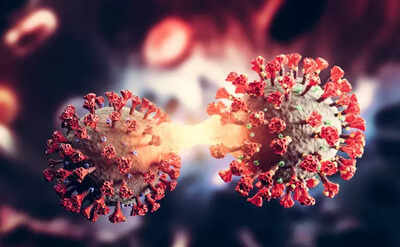- News
- World News
- US News
- Why the newest Covid variant 'JN.1' is worrying scientists
Trending
This story is from November 7, 2023
Why the newest Covid variant 'JN.1' is worrying scientists
Scientists are alarmed by a new Covid-19 variant, JN.1, which is believed to be more infectious and capable of evading vaccine immunity. The variant, identified in Luxembourg, has since spread to several countries. It contains a significant number of unique mutations, particularly in the spike protein, that may contribute to increased infectivity and immune evasion. However, initial data suggests that updated vaccines and treatments will still offer protection against JN.1. This variant's resemblance to earlier variants with distinct spike proteins is also noteworthy.

NEW DELHI: A Covid-19 variant that may be more infectious and could evade vaccine immunity has caused alarm among scientists tracking the adaptability of the SARS-CoV-2 virus.
This latest emerging variant, JN.1, was identified in Luxembourg on August 25, 2023, followed by England, Iceland, France, and the US.
Scientists were specially astonished by the sheer amount of differences in the variant compared to other leading Covid strains today such as XBB.1.5 and HV.1.
But JN.1 is vastly different.
'A devious strain'
While there are ten additional unique mutations in HV.1 compared to XBB.1.5, JN.1 contains 41 additional unique mutations compared to XBB.1.5.
Most of the changes in JN.1 are found in the spike protein, which likely correlates to increases in infectivity and immune evasion. This might mean that current vaccines will not work to keep the virus at bay.
"Due to a mutation on its spike protein JN.1 seems to be much more immune evasive than its parents, making it quite devious. As a result, we may be at risk of getting more infections,” said Dr Thomas Russo, chief of infectious diseases at the University of Buffalo in New York.
“There is some data that suggest JN.1’s parent BA.2.86 may be more transmissible than previous variants,” he added.
Such vast differences in spike proteins of variants were first seen in 2021, during the start of the pandemic, in the alpha and beta versions of SARS-CoV-2.
Their reemergence in JN.1 is noteworthy, said scientists.
The US Centers for Disease Control and Prevention (CDC), however, said initial data suggest that updated Covid vaccines will help protect against JN.1.
It also said an analysis from the federal government’s SARS-CoV-2 Interagency Group suggests treatments and testing will remain effective.
This latest emerging variant, JN.1, was identified in Luxembourg on August 25, 2023, followed by England, Iceland, France, and the US.
Scientists were specially astonished by the sheer amount of differences in the variant compared to other leading Covid strains today such as XBB.1.5 and HV.1.
The XBB.1.5 variant is the target of the latest vaccine boosters in the US and most emerging variants are descendants of this virus, which means that current vaccines work on all of them. HV.1 is a relative newcomer and boasts a few differences from XBB.1.5 but is mainly similar to its parent strain.
But JN.1 is vastly different.
'A devious strain'
While there are ten additional unique mutations in HV.1 compared to XBB.1.5, JN.1 contains 41 additional unique mutations compared to XBB.1.5.
Most of the changes in JN.1 are found in the spike protein, which likely correlates to increases in infectivity and immune evasion. This might mean that current vaccines will not work to keep the virus at bay.
"Due to a mutation on its spike protein JN.1 seems to be much more immune evasive than its parents, making it quite devious. As a result, we may be at risk of getting more infections,” said Dr Thomas Russo, chief of infectious diseases at the University of Buffalo in New York.
“There is some data that suggest JN.1’s parent BA.2.86 may be more transmissible than previous variants,” he added.
Such vast differences in spike proteins of variants were first seen in 2021, during the start of the pandemic, in the alpha and beta versions of SARS-CoV-2.
Their reemergence in JN.1 is noteworthy, said scientists.
The US Centers for Disease Control and Prevention (CDC), however, said initial data suggest that updated Covid vaccines will help protect against JN.1.
It also said an analysis from the federal government’s SARS-CoV-2 Interagency Group suggests treatments and testing will remain effective.
End of Article
FOLLOW US ON SOCIAL MEDIA










